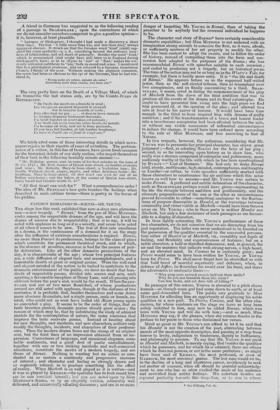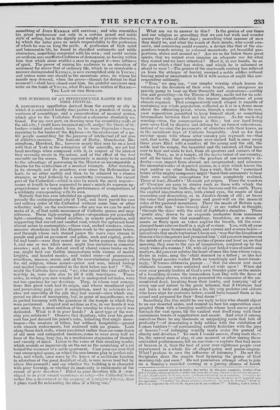U LTIMUS ROMANORUIVI—RIEN ZI—MR. YOUNG.
Tim stage has this week exhibited that now-a-days rare phenome- non—a new tragedy. "Rienzi," from the pen of Miss MITFORD, ranks among the respectable dramas of the age, and will have the degree of success due to respectability ; that is to say, it will be acted with applause as long as it is a novelty, and cease to be acted at all when it ceases to be new. The test of first-rate excellence in a drama, is the continuance of a demand for it on the stage after the influence of extrinsic considerations is expired. Rienzi, no more than Foscari its predecessor, belongs to the class of plays which constitute the permanent theatrical stock, and to which, in the absence of novelties, recourse is had for the means of pub- lic delectation. Like all the other dramatic productions of the day, it is characteristic of the age ; whose two principal features arc, a wide diffusion of elegant taste and accomplishments, and a lamentable dearth of great or original genius. Were the well-read and elegant-minded of the nation to be tasked to contribute to the dramatic entertainment of the public, we have no doubt that hun- dreds of respectable poems, divided into scenes and acts, each meriting a favourable reception at Drury Lane, and all passing into oblivion before the year's end, would be the result. When SHAKS- PEARE and one or two more flourished, of whose productions several are still acted with applause, though at the distance of two centuries, it is probable that, besides themselves and some dozen more obscurer dramatists, not a single person, male or female, ex- isted, who could not as soon have boiled old /son young again as concocted a play. It seems to be the order of things, that as taste becomes general, dramatic genius should grow scarce ; the reason of which may be, that by substituting the study of admired models for the contemplation of nature, the same exercises that improve the taste enervate genius. Instead of beating about for new thoughts, new incidents, and new characters, authors only modify the thoughts, incidents, and characters of their predeces- sors. Thus the modern drama bears not the stamp of an original seal, but the faint lines of an impression obtained from an im- pression. Correctness of language, and occasional elegance, some noble sentiments, and a good deal of poetic embellishment, together with one or two striking incidents and well-conceived situations, constitute the merits of a modern tragedy, and are those of Rienzi. Nothing is wanting but an action so con- ducted as so sustain a continuity and progressive increase of interest • and character and feeling so strongly drawn and so copiously infused, as to produce something like the effect of reality. When Macbeth is as well played as it is written—and it was so played by KEMBLE—the spectator has to look round him ere he can recollect himself; but you are acted upon by Miss MrrFoRD's drama, as by an elegantly written, admirably well delivered, and occasionally affecting discourse ; and are in no more danger of forgetting Mr. YOUNG in Rienzi, than of taking the preacher to be anybody but the reverend individual he happens to be.
The character and story of RIENZI* have certainly considerable dramatic capabilities ; but Miss MITFORD is not endowed with an imagination strong enough to conceive the first, as it were, afresh, or sufficiently mistress of her art properly to modify the other. She has been content to adopt the events, and to follow the order of history, instead of compelling them into the form and suc- cession best adapted to the purposes of the drama ; she has accommodated Rienzi with speeches suitable to each occasion ; and ended by producing not a tragedy, but an historical poem. The time of the action may not be so long as in the Winter's Tale, for example, but there is hardly more unity. It is " the life and death of Rienzi." He appears before us as the supposed half-witted jester, then as the self-elected tribune, then as triumphant over two conspiracies, and as finally succumbing to a third. &lax- SPEARE. it seems, erred in dating the commencement of his play of Macbeth from the dawn of the fatal ambition that was to produce all the events of the drama and its final catastrophe. He ought to have presented him rising into the high place we find him possessed of, at the opening of the play ; and allowed two acts at least to his career of honour. It would have been time enough in the third to have inspired hint with dreams of guilty ambition ; and if the transformation of a brave and honest leader into a treacherous conspirator had been effected between the acts, or without any visible succession of influential circumstances to induce the change, it would have been ordered more according to the rule of Miss MITFORD, and less according to that of N attire.
In two respects, however, the authoress, considering that Mr. YOUNG was to personate her principal character, has shown great judgment ;—first, in selecting RIENZI for the hero of her play ; second, in so far innovating upon history as to draw him, who really was a strange compound of enterprise and poltroonery, more uniformly worthy of the title with which he has been apostrophized by BYRON—" Last of Romans." She had only to make Rienzi bold, sturdy, mettlesome, high-minded, contemptuous, and haughty as Lucifer—or rather, to write speeches sufficiently marked with those characters to countenance the air and tone which this actor knows so well how to assume—and Mr. YOUNG was certain to make Rienzi. A profound and subtile delineation of the character, such as SHAKSPEARE perhaps would have given—representing to the life the struggle between ambition and pusillanimity, and the alternate preponderance of the one or the other as circumstances proved favourable to either—something analogous to the fluctua- tions of purpose discernible in Hamlet, or the waverings between criminality and virtue visible in Macbeth—would have been thrown away on Mr. YOUNG; who in these parts is neither Hamlet nor Macbeth, but only a fine declaimer of such passages as are favour- able to a display of elocution.
In thus lightly estimating Mr. YOUNG'S performance of these two characters, we do not conceive that we are detracting from his just reputation. The latter was never understood to be f6ounded on the possession of the qualities essential to the successful persona- tion either of Hamlet or of Macbeth, viz., versatility and depth of feeling and flexibility and expressiveness of features ; but on a noble elocution, a bold or dignified demeanour, and, in general, the air and the manners that indicate well-strung nerves, a high heart, and an elevated mind. In Cassius he is uniformly great ; and Pierre would seem to have been written for YOUNG, or YOU:VG born for Pierre. We shall never forget how he electrified us with that bold burst of scornful superiority and defiance, when, in defence of Jaffier, he flourishes his sword over his head, and dares his adversaries to unsheathe theirs :— " Why peep your coward swords half out their shells ?
Why do you not brandish them like mine ?
You fear to die, and yet dare talk of killing 1"
In passages of this nature, Yourva is elevated to a pitch above human—as though some god had come down to earth, or at least some god-descended hero. The public owe gratitude to Miss MITFORD for affording him an opportunity of displaying his noble qualities in a new part. To Pierre, at-9ms, and the other cha- racters, for whose existence on the stage we have so long been solely indebted to him, may now be added Rienzi, which was born with YOUNG and will die with him ;—and so much Miss MirFonn may say, if she pleases, when she returns thanks in the preface to her poem to those who declaimed her verses.
Merit so great as Mr. YOUNG'S can afford to let it be said that his Hamlet is not the creation of the poet, alternating between moods of the most opposite description, and passing at a step from horror to levity, indignation to tenderness, dignity to buffoonery, and philosophy to passion. To say that Mr. YOUNG is not great in Hamlet and Macbeth, is merely saying, that besides the qualities which he possesses, and for which he is admired, there are others which he does not possess, or not in the same perfection ; as might have been said of KEMBLE, the most profound, or even of GARRICK, the most universal genius. The last men would we be, in the decline of a long and illustrious career, invidiously to seek out matter of censure, when all should be grateful acknowledg- ment to one who has so often exalted the souls of his audience and revivified their nobler feelings. We entertain besides an especial partiality towards this tragedian, as to one in whom
See Gibbon; Vol. vl.
something of Jonar KEMBLE still survives ; and who resembles his great predecessor not only in a . certain grand and noble style of acting, but in the dignity and weight of private character, by which the latter gave so much respectability to the profession of which he was so long the pride. A gentleman of high spirit and honourable life, he found in dignified sentiments and noble characters, something congenial with his own ; and could sustain an uniform and unaffected loftiness of demeanour, as having within him that which alone enables a man to support it—true loftiness of spirit. The power of raising his audience to an elevation of sentiment far above that of ordinary life, which in so remakable a manner distinguished KEMBLE, is now exemplified only in YOUNG; and unless some one should in the meantime arise, on whom his mantle may descend, when the grave—though far distant be that moment 1—shall have closed over him, his grateful survivors may write on the tomb of YOUNG, what BYRON has written of Riaarzi
THE LAST OF THE ROMANS.



















 Previous page
Previous page